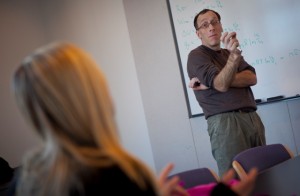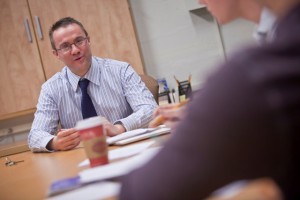
Steven Mylon, associate professor of chemistry
Each semester, the Interdisciplinary Seminar Series in the Life Sciences brings six world-class scholars to campus to speak on a subject in their field. Guest lecturers last semester included Martin Chalfie, winner of the 2008 Nobel Prize in Chemistry; investigative reporter Brian Deer, who uncovered evidence showing that research linking childhood vaccines with autism was fraudulent; and chemistry professor Piero Baglioni of the University of Florence, who spoke about nanotechnology.
The lunchtime lectures are open to anyone, and although the information presented in the lectures is accessible on a general level to the public, it helps to have some technical competence in order to grasp the specifics of the material.
“What we have found is that there is a subset of students who want to get the deeper level,” says James Ferri, associate professor and head of chemical and biomolecular engineering, who organizes the seminar series with Steve Mylon, associate professor of chemistry.
To serve those students’ interest, Ferri and Mylon offer a course that is directly connected to the seminar series. Students taking the course are given reading assignments, often suggested by the lecturers themselves, to familiarize themselves with the subject in advance of each seminar.

James Ferri, associate professor and head of chemical and biomolecular engineering
They also spend time interacting with the guest lecturers, asking questions about their research, their fields of expertise, and their experiences. Additionally, it is common for students to take the lecturer out to lunch after an event, where they can continue the discussion. Although the course is open to students from any major who meet the prerequisites, it is required for students who want to minor in health and life sciences.
Amanda Balaban ’12 (Bethesda, Md.), a biology major, says the most valuable aspect of the course is being able to have in-depth conversations with the experts.
“It was beneficial for me to be able to discuss with speakers their experiences and how they got where they are now. For example, how they chose the degree they wanted, what type of program they wanted to go into, what area of science they wanted to go into, etc. Thus, we got to know these scientists on a professional and personal level” Balaban says.
Learning about topics from an interdisciplinary perspective tends to open students’ eyes to non-linear career paths and motivates them to try courses outside their major, Ferri says. “What they come away with is an understanding that there isn’t a bright line between these disciplines; the topic is prominent, not the discipline. They begin to see that there is a need to cross boundaries to solve problems.”
Hallie Zeller ’12 (Bridgewater, N.J.), a mechanical engineering major who took the course twice, says the interdisciplinary nature of the seminar series has given her a broader, more global perspective.
“I found myself fascinated by all sorts of fields of science that were unfamiliar to me before taking this course. With an intimate class setting consisting of students from various departments of science and engineering, our discussions brought together input from many points of view. I noticed that the life science lectures rarely fit the mold of just one particular field, and I’ve come to realize the importance of connecting bridges between disciplines,” Zeller says.

